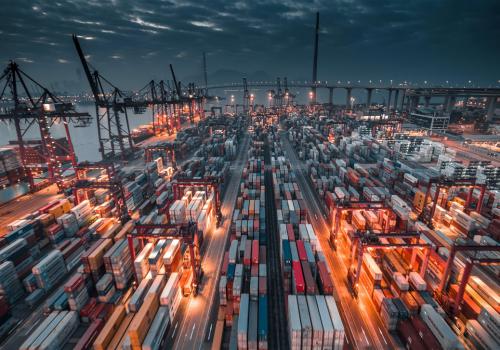UAE’s cabinet has approved an export development policy that aims to support the country’s foreign trade and to increase the non-oil sectors’ contribution to GDP, according to a statement by Emirates News Agency (WAM). Following the cabinet’s meeting last Wednesday, the vice president and prime minister of the UAE and ruler of Dubai Sheikh Mohammed bin Rashid Al Maktoum tweeted that, under the policy, local products will make up 50 percent of exports. Economists see this move as a positive step to reduce the country’s reliance on oil and gas and diversify exports. Historically, the UAE and other Gulf countries have allocated limited resources to developing their non-hydrocarbon merchandise exports because of the plentiful opportunities afforded by the abundant oil and gas reserves, said the Director of Research at Derasat Omar Al-Ubaydli, but this has recently changed. “However, with falling oil prices and a global commitment to more sustainable sources of growth, the UAE and other Gulf countries are looking to diversify their exports, to create jobs for their citizens and to acquire the foreign exchange required to fund their imports,” said Al-Ubaydli.
“The UAE's recent announcement reflects these changing priorities and constitutes an attempt to exploit trade channels that were previously available but were not taken advantage of. However, the results will take some time to materialise, and so a patient and long-sighted policy framework is critical,” he continued. When it comes to the export products themselves, re-exports play an important role in the country’s economy, said Robert Mogielnicki, resident scholar at the Arab Gulf States Institute in Washington DC. “The UAE has been more successful positioning itself as a trading hub than developing a strong local export capacity outside of the oil and gas sector. There is a significant overlap between the country's primary imports and exports of non-oil goods, revealing the central importance of re-exports for the UAE's economy,” said Mogielnicki. While there is “nothing inherently wrong” with re-exports, an overreliance on them when it comes to trade flows has certain risks as re-export hubs are vulnerable to shocks in global supply chains and reconfiguration of trade routes, Mogielnicki said. Recent events, including the coronavirus pandemic and the Ever Given ship temporarily stuck in the Suez Canal, have highlighted how shocks to the global supply chain can disrupt trade.
“UAE officials seem interested in asserting greater control over their non-oil trade and deriving greater in-country value from trading activities. Given the country's highly-concentrated free zone system, which plays a key role in re-exports, it makes sense to focus on other economic spheres with room to grow,” said Mogielnicki. “Increasing local exports by supporting UAE-based industrial firms and manufacturers will require an expensive, sustained commitment from governments at the emirate and federal levels. UAE officials will want to identify high-potential trade corridors and partnerships and then prioritise targeted support to local firms that can best tap into these trade flows,” he continued. Mogielnicki said: “On a broader level, this policy appears connected to recent efforts to depict the UAE as a permanent destination for businesses and expatriates, rather than simply a transitory location for goods and people.”
